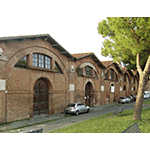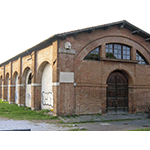Medici Shipyards
It was the idea of Cosimo I de’ Medici to build a shipyard in Pisa for the ships of the powerful Tuscan fleet. Already in operation around 1540, the new Medici shipyard launched the first galley entirely built by local workers in 1546. The Shipyard also witnessed the participation of Buontalenti, and was divided into eight aisles of an average length of 60 metres, 8 metres high, and about 10 metres wide. It was part of a project that intended to restore Pisa its ancient splendour that had been lost with the city’s surrender to the Florentines in 1509. The institution of the Order of Saint Stephen in 1562 and the transfer of the Medicinal Herbs Garden to the same area in 1563, were also part of this project. The competition of the shipyards of Livorno and Portoferraio, along with changes in maritime politics, however, soon decreed a slow and inexorable decline to the point that in the mid 18th century, under Lorraine rule, the premises were transformed into a horse stable for the Dragoon regiment.
The restored area of the Shipyard today house several exhibitions that present part of the important finds, uncovered as of 1998, of relicts of boats and trappings found in the ancient Etruscan and Roman port area of Pisa, located near the Pisa-San Rossore railway station. This was an early port structure of the archaic age, with the remains of 19 ships of different tonnage (from the cargo ship to the river punt), and dating to a period between the late Hellenistic age and the late ancient age. These discoveries constitute a fundamental element in understanding the means of sea transportation in antiquity between the 5th century B.C. and the 5th century A.D.
The Ships Museum is presently being set up in the Shipyards of the Knights of Saint Stephen, and will present the finds in a spectacular exhibition. Conceived as an "exhibition in progress", the Exhibition of Ships will indeed seek to make the visitor a participant in the various phases of the recovery works, from the archaeological excavation to the restoration laboratory to the final, but not definitive exhibition of the materials.
****************************
Texts by Elena Fani
English translation by Victor Beard
Last update 02/feb/2008





